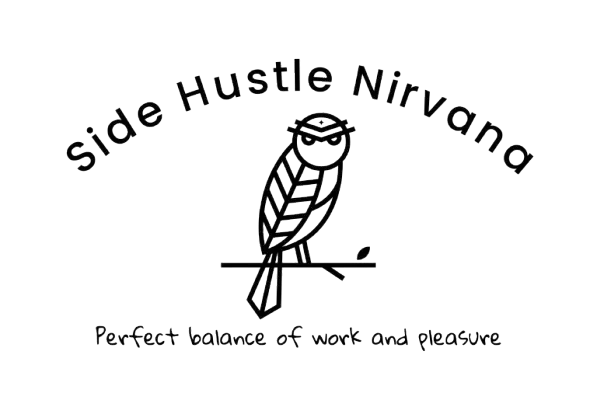From Learning to Earning: Certifications That Can Transform Your Side Hustle
In today’s fast-paced and competitive job market, upskilling is vital to stay relevant and increase our earning potential. Whether you’re looking to enhance your side hustle or pivot to a new career, certifications can be a game-changer. They not only validate your expertise but also open doors to new opportunities. In this article, we’ll explore the value of certifications, different types available, the process of getting certified, financing options, and how to leverage your certifications effectively.
Understanding the Value of Certifications
Certifications are more than just pieces of paper. They are a testament to your dedication and knowledge in a specific field. With the rapid advancement of technology and ever-evolving industry standards, employers and clients are increasingly looking for professionals with proven expertise. By obtaining relevant certifications, you demonstrate your commitment to continuous learning and staying ahead of the curve.
The Role of Certifications in Career Advancement
One of the key benefits of certifications is their potential to propel your career forward. They can help you stand out from the competition and increase your marketability. Whether you’re seeking a promotion within your current company or looking to land a new job, certifications can give you a distinct advantage. Employers value certifications because they provide assurance of your skills and significantly reduce the training time required.
How Certifications Can Boost Your Side Hustle
If you have a side hustle or are thinking of starting one, certifications can be a game-changer. They not only enhance your credibility but also enable you to offer specialized services or enter new markets. For example, a software developer with a certification in a popular programming language can attract clients looking for experts in that area. Certifications can also help you command higher rates and increase your earning potential, making your side hustle a more lucrative venture.
Furthermore, certifications can open doors to networking opportunities. Many certification programs offer exclusive communities or events where you can connect with like-minded professionals and industry leaders. These connections can lead to valuable collaborations, mentorship opportunities, and even job offers. By expanding your professional network through certifications, you increase your chances of finding new clients or discovering exciting career opportunities.
Additionally, certifications can provide a sense of personal accomplishment and validation. The process of studying, preparing, and passing a certification exam requires dedication and hard work. When you receive that certification, it serves as tangible proof of your expertise and can boost your confidence in your abilities. This confidence can translate into better performance in your current role or when pursuing new opportunities.
Exploring Different Types of Certifications
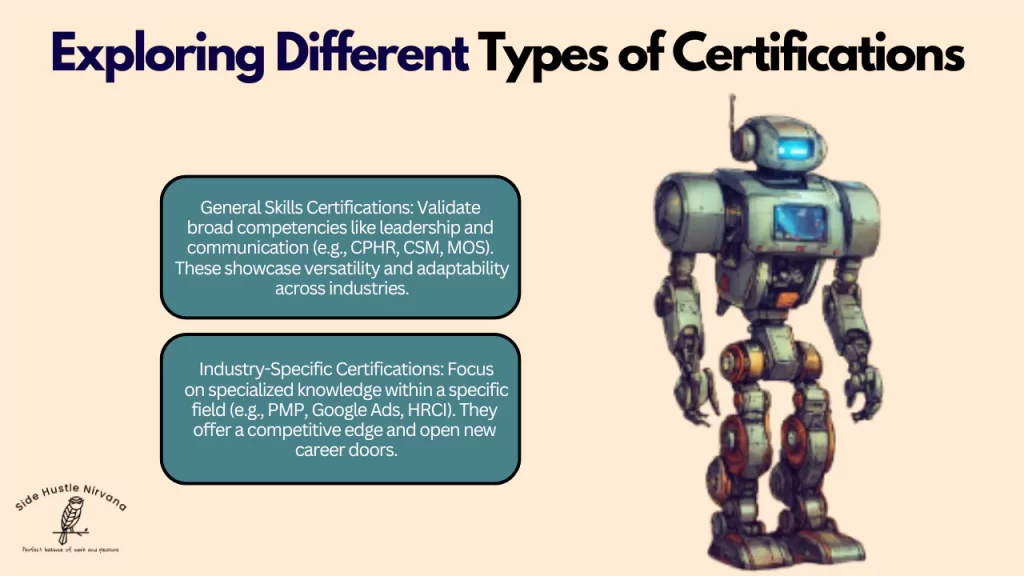
There is a wide range of certifications available across various industries and skill sets. Let’s take a closer look at two primary types:
Industry-Specific Certifications
These certifications are tailored to specific industries and validate your knowledge and skills in that particular field. Whether you’re a project manager, a digital marketer, or an HR professional, there are industry-specific certifications that can provide a competitive edge. Examples include the Project Management Professional (PMP) certification, Google Ads certifications, and Human Resource Certification Institute (HRCI) certifications.
Industry-specific certifications often require candidates to demonstrate a deep understanding of industry trends, best practices, and specialized knowledge. These certifications can open doors to new career opportunities and showcase your expertise to potential employers. Additionally, maintaining and renewing industry-specific certifications may involve continuing education to stay current with the latest developments in the field.
General Skills Certifications
Unlike industry-specific certifications, general skills certifications focus on broader competencies that are applicable across multiple industries. These certifications validate essential skills such as communication, leadership, problem-solving, and project management. Examples include the Certified Professional in Human Resources (CPHR), Certified ScrumMaster (CSM), and Microsoft Office Specialist (MOS) certifications.
General skills certifications are valuable for professionals looking to enhance their overall skill set and adaptability in today’s diverse job market. They demonstrate a candidate’s versatility and ability to excel in various roles and industries. Pursuing general skills certifications can also help individuals stand out in competitive job markets and showcase their commitment to continuous learning and professional development.
The Process of Getting Certified
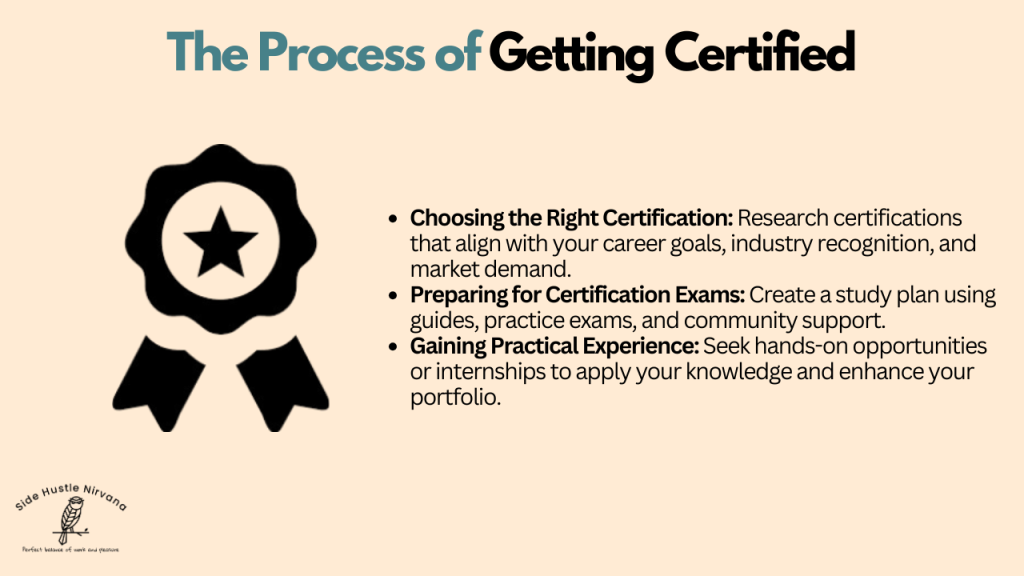
Getting certified involves a well-defined process that starts with selecting the right certification for your goals and ends with passing the certification exam. Here are the key steps you need to follow:
Choosing the Right Certification for You
Before embarking on your certification journey, it’s essential to identify your career aspirations and the skills you want to develop. Research the certifications available in your chosen field and evaluate their relevance to your goals. Consider factors such as industry recognition, job market demand, and your existing knowledge and experience.
Furthermore, it’s beneficial to reach out to professionals who already hold the certification you’re interested in. They can provide valuable insights into the real-world applications of the certification and offer advice on how to best prepare for the exam. Networking with certified individuals can also open up new opportunities and mentorship possibilities in your field.
Preparing for Certification Exams
Once you’ve selected a certification, it’s time to prepare for the exam. Create a study plan and allocate dedicated time for studying each day. Utilize resources such as study guides, practice exams, and online courses to enhance your knowledge and test your understanding. Don’t forget to leverage community forums and support groups to connect with fellow exam takers and gain valuable insights.
Additionally, consider exploring hands-on learning opportunities or internships related to the certification. Practical experience can complement your theoretical knowledge and provide a deeper understanding of the concepts being tested in the exam. Engaging in real-world projects can also help you build a portfolio to showcase your skills to potential employers once you are certified.
Financing Your Certification
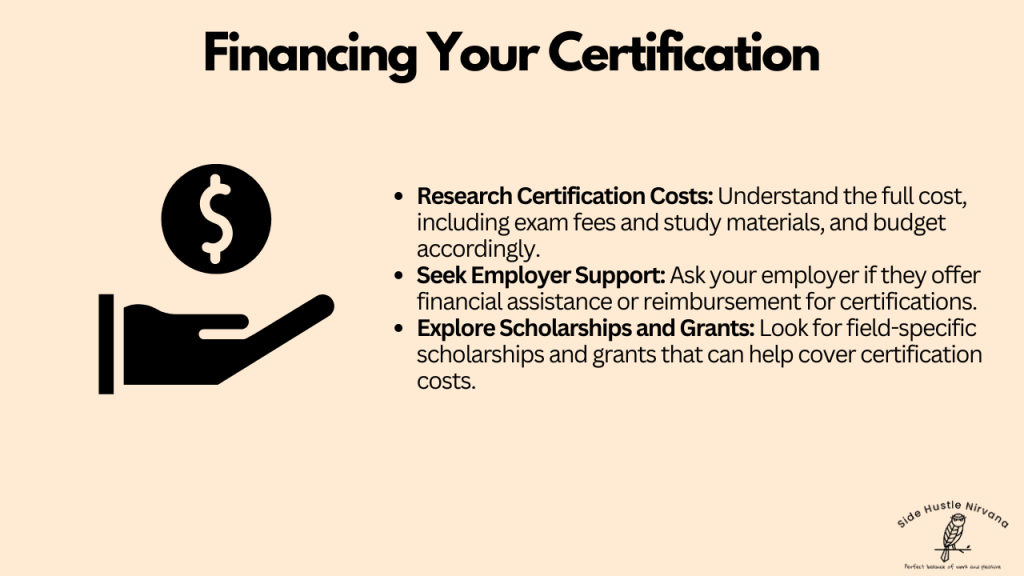
While certifications can significantly boost your career prospects, they can come with a financial burden. However, there are several ways you can ease the financial strain:
Cost of Certifications and How to Budget
Start by researching the cost of the certification you’re interested in. Take into account not only the exam fees but also any additional study materials or training courses you may need. Once you have a clear understanding of the total cost, create a budget and set aside funds specifically for your certification journey. Cut down on unnecessary expenses, explore lower-cost alternatives, and consider reaching out to your employer for financial support.
Scholarships and Grants for Certifications
Many organizations and institutions offer scholarships and grants to aspiring professionals seeking certifications. Look for opportunities specific to your field, such as industry associations, nonprofit organizations, or educational institutions. These scholarships can provide financial assistance and potentially cover some or all of your certification expenses.
Utilizing Your Certification
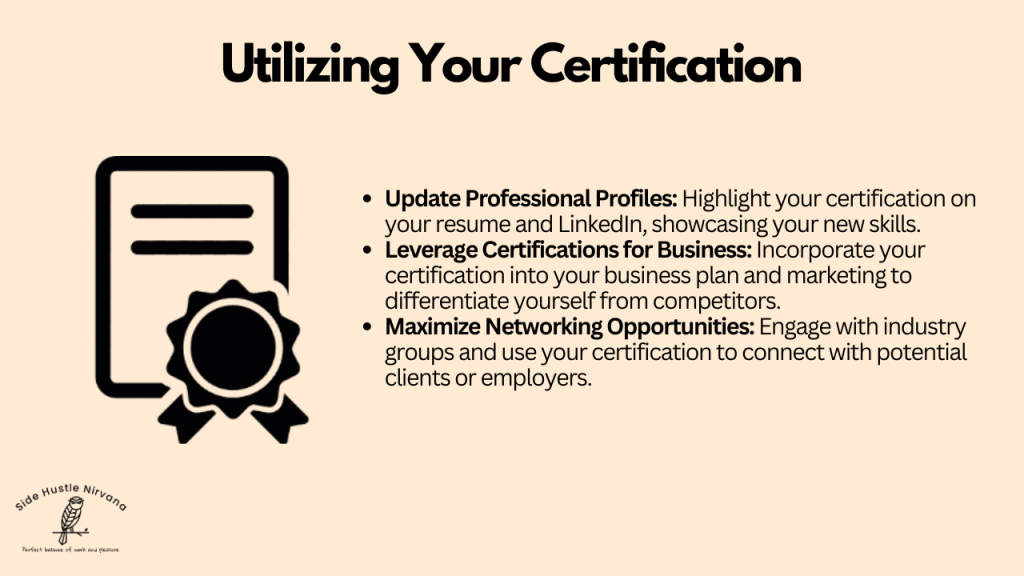
Once you’ve earned your certification, it’s time to put it to work and maximize its impact:
Marketing Your New Skills
Update your resume and LinkedIn profile to highlight your certification. Include specific details about the skills and knowledge you gained during the certification process. Leverage your network and professional connections to showcase your new credentials. Consider joining relevant industry groups or forums to engage with potential clients or employers actively.
Incorporating Certifications into Your Business Plan
If you have a side hustle or are an entrepreneur, certifications can enhance the value you offer to clients and help you differentiate yourself from competitors. Incorporate your certifications into your business plan, marketing materials, and client communications. Clearly articulate the benefits your certifications bring to the table and how they align with your clients’ needs.
In conclusion, certifications have the power to transform your side hustle and open doors to new opportunities. By investing in your skills and knowledge, you not only increase your earning potential but also position yourself as a sought-after professional. Choose the right certification, prepare diligently, explore financing options, and leverage your credentials to take your side hustle to new heights. Embrace the learning journey, and watch your side hustle flourish!
